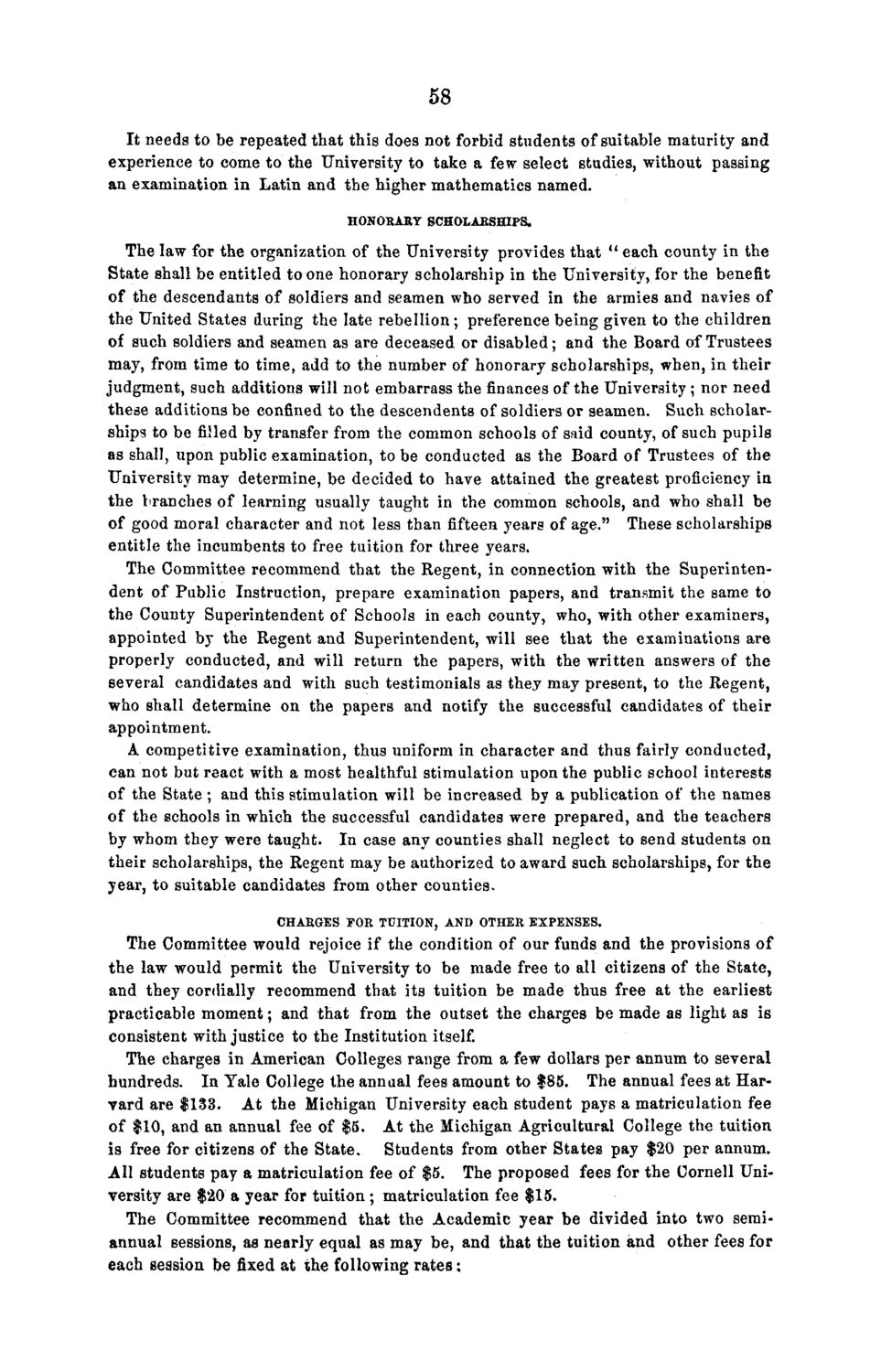| |
| |
Caption: Board of Trustees Minutes - 1868
This is a reduced-resolution page image for fast online browsing.

EXTRACTED TEXT FROM PAGE:
58 It needs to be repeated that this does not forbid students of suitable maturity and experience to come to the University to take a few select studies, without passing an examination in Latin and the higher mathematics named. HONORARY SCHOLARSHIPS. The law for the organization of the University provides that " each county in the State shall be entitled toone honorary scholarship in the University, for the benefit of the descendants of soldiers and seamen who served in the armies and navies of the United States during the late rebellion; preference being given to the children of such soldiers and seamen as are deceased or disabled; and the Board of Trustees may, from time to time, add to the number of honorary scholarships, when, in their judgment, such additions will not embarrass the finances of the University ; nor need these additions be confined to the descendents of soldiers or seamen. Such scholarships to be filled by transfer from the common schools of said county, of such pupils as shall, upon public examination, to be conducted as the Board of Trustees of the University may determine, be decided to have attained the greatest proficiency in the branches of learning usually taught in the common schools, and who shall be of good moral character and not less than fifteen years of age." These scholarships entitle the incumbents to free tuition for three years. The Committee recommend that the Regent, in connection with the Superintendent of Public Instruction, prepare examination papers, and transmit the same to the County Superintendent of Schools in each county, who, with other examiners, appointed by the Regent and Superintendent, will see that the examinations are properly conducted, and will return the papers, with the written answers of the several candidates and with such testimonials as they may present, to the Regent, who shall determine on the papers and notify the successful candidates of their appointment. A competitive examination, thus uniform in character and thus fairly conducted, can not but react with a most healthful stimulation upon the public school interests of the State ; and this stimulation will be increased by a publication of the names of the schools in which the successful candidates were prepared, and the teachers by whom they were taught. In case any counties shall neglect to send students on their scholarships, the Regent may be authorized to award such scholarships, for the year, to suitable candidates from other counties. CHARGES FOR TUITION, AND OTHER EXPENSES. The Committee would rejoice if the condition of our funds and the provisions of the law would permit the University to be made free to all citizens of the State, and they cordially recommend that its tuition be made thus free at the earliest practicable moment; and that from the outset the charges be made as light as is consistent with justice to the Institution itself. The charges in American Colleges range from a few dollars per annum to several hundreds. In Yale College the annual fees amount to $85. The annual fees at Harvard are $133. At the Michigan University each student pays a matriculation fee of $10, and an annual fee of $5. At the Michigan Agricultural College the tuition is free for citizens of the State. Students from other States pay $20 per annum. All students pay a matriculation fee of $5. The proposed fees for the Cornell University are $20 a year for tuition ; matriculation fee $15. The Committee recommend that the Academic year be divided into two semiannual sessions, as nearly equal as may be, and that the tuition and other fees for each session be fixed at the following rates:
| |